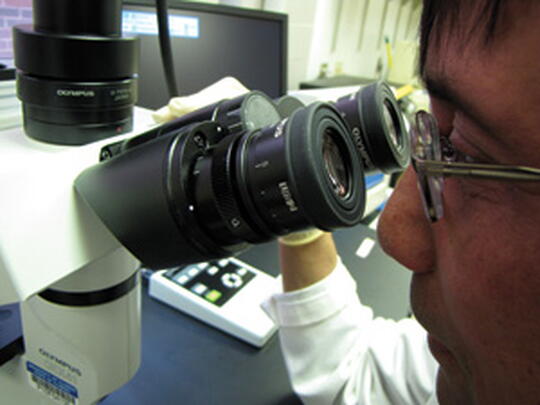
In keeping with the long-standing and rich tradition of research and training in reproductive biology at the University of Illinois, Urbana-Champaign, the National Institute of Child Health and Human Development (NICHHD) has awarded funds to create a Center for Research in Reproduction and Infertility on this campus. The five-year award from the NICHHD is for $6.8 million, and substantial matching funds were committed by the School of Molecular and Cellular Biology, representing the culmination of two years of effort to obtain funding.
Milan K. Bagchi is director of the new National Center for Research in Reproduction and Infertility at UIUC. He joined MIP in 2001 and was promoted to professor in 2005. He holds a Ph.D. from the University of Nebraska in chemistry, received postdoctoral training with Bert O’Malley at the Baylor College of Medicine, and was a senior scientist and laboratory head at the Population Council and The Rockefeller University before joining MIP. His research interest is steroid hormone signaling mechanisms controlling reproduction and development. His research group studies molecular genetic models of reproductive dysfunctions and hormone-dependent breast, endometrial and ovarian cancers.
In keeping with the long-standing and rich tradition of research and training in reproductive biology at the University of Illinois, Urbana-Champaign, the National Institute of Child Health and Human Development (NICHHD) has awarded funds to create a Center for Research in Reproduction and Infertility on this campus. The five-year award from the NICHHD is for $6.8 million, and substantial matching funds were committed by the School of Molecular and Cellular Biology, representing the culmination of two years of effort to obtain funding.
The goal of this new center is to understand, at molecular and cellular levels, the hormonal mechanisms that regulate embryo implantation and fertility. Implantation is a complex process driven by a cascade of cellular signaling events regulated by maternal hormones. Failure of the fertilized embryo to implant into the uterus is a major cause of infertility, a public health issue. The scientists at this center will employ innovative investigative strategies to explore the cellular pathways that control maternal-fetal interactions during implantation and to identify factors that underlie infertility in women suffering from endometriosis, a common gynecologic disorder. In subjects with endometriosis, the endometrial tissue grows in locations other than its normal environment of the uterus, causing pelvic pain and infertility. Endometriosis is reported to affect approximately 15% of reproductive age women, and is observed in 30–40% of women with infertility.
The knowledge gained from these studies will have a direct impact on women’s health by helping to develop new molecular diagnostic tools for screening endometrial dysfunction, and enabling targeted therapeutic strategies for the treatment of infertility.
The program comprises four complementary, synergistic projects: three basic research projects at the University of Illinois (led by Professor of Molecular and Integrative Physiology Milan Bagchi, Swanlund Professor of Molecular and Integrative Physiology Benita Katzenellenbogen, and Professor of Veterinary Biosciences Indrani Bagchi), and one clinical project at the Emory University School of Medicine (Atlanta, GA) led by Dr. Robert Taylor. The University of Illinois research team also includes Dr. Yuechao Zhao, a postdoctoral trainee in molecular and integrative physiology, who has recently joined the center.

The three basic research projects at the University of Illinois will address cellular mechanisms underlying implantation, using the mouse as a model system. The lead uterine factors that are found to be critical for implantation in the mouse model will be tested in human endometrial tissues, provided by the Emory group, to evaluate whether the same factors operate in the human. In this collaboration, investigators will examine whether these pathways operate in an aberrant manner in endometrial tissue obtained from individuals suffering from endometriosis.
Collectively, these researchers are working together to understand the molecular basis of human infertility associated with endometrial dysfunction. The center’s program, which serves as a foundation for the professional development of young scientists wishing to pursue careers in important areas of women’s health and infertility research, is also an excellent model for the University’s current mission of enhancing translational research in biology.
The research in this Center is supported by the Eunice Kennedy Shriver National Institute of Child Health and Human Development (NICHD) of the National Institutes of Health (NIH) through a cooperative agreement as part of the Specialized Centers Program in Reproduction and Infertility Research. The Center also receives generous institutional support from the Office of the Vice Chancellor of Research, the School of Molecular and Cellular Biology, and the College of Veterinary Medicine of the University of Illinois Urbana-Champaign.
Results from these studies should improve understanding of the mechanisms and cellular pathways that control implantation and help identify factors that underlie infertility in women with endometriosis. They should also aid in developing new molecular diagnostic tools for screening endometrial dysfunction and enable targeted therapeutic strategies for the treatment of infertility.